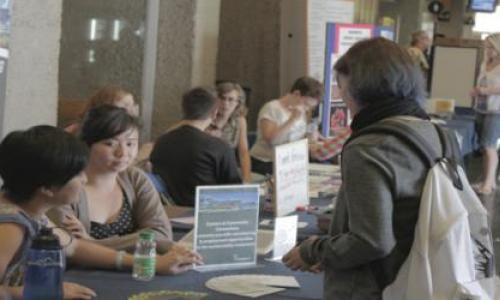
You are a proud SFU graduate who is ready to take on the world and put your knowledge, skills and strength to work. Here are some tips for those of you who are looking to make the transition from being a full time student to your first job as a new graduate.
First Tip: Job searching is a full time job. Think of yourself as the CEO of your own small business. Doing so will help you stay focused,and commit to a daily schedule. You will also show people around you that you are serious about landing your first job.
Other Tips:
-
Define your goals and your brand. It can be challenging to stop and ask yourself, "What do I really want out of my first job?" You are unique. Find out what is so unique about you. Defining your brand can help set you apart from the competition. When an employer asks, "Why should I hire you?" you should already have a list of your best qualities, skills and qualifications.
-
Set up a home office. Separate the space from the rest of your house where it is free from the usual ‘hustle and bustle’. Put up a curtain or separators if necessary. Get out of your pajamas and into your work clothes. It may sound silly but many people who work from home swear they get more done by dressing the part.
-
Schedule your work time as if it were a job. If you can’t do it every day, at least set aside some time each week to work on your job search. Avoid checking your e-mail first thing in the morning. Email overload is a huge problem and emails typically sidetrack you from doing the tasks you’ve set out to do.
-
Establish a target date for getting a job (i.e. by September, or in the next 3 months). This will motivate you and help you stay on track to accomplish the short term goal that you’ve set for yourself.
-
Uncover opportunities. The job market is composed of both published and unpublished opportunities, and you need to uncover both areas. Review advertised positions, consider targeted mailings to individuals and organizations, career fairs, search firms and recruiters, as well as networking events that may be held in your area.
-
Prepare your work search materials -- resume, cover letter, create and/or update social media profiles. Chances are that your resume hasn’t been updated in a while. Add any relevant experience you have gained since last update and mark everything with appropriate dates.
-
GET HELP! There are so many resources out there that can help you in various aspects of the job search. Resume, interview, help on where to look, mental support, and more and more. Take advantage of it and don’t overload yourself.Check out Career Services (MBC 0300 www.sfu.ca/careers). We are your work search experts.
-
Stay balanced. Job searching can take a lot out of you. Make sure you get plenty of rest, talk to friends and family, stay active and allow yourself those moments to do things you enjoy. Take the time to play a video game, go for a jog or play with your pets -- do whatever it takes to get you back to you.
-
Most important thing is to be proactive. Connect with others and have a can-do attitude, and you'll find yourself in a totally different situation in a couple months from now.
If you’re a recent graduate and you have been actively seeking work for minimum 3 months, and possess the motivation, the Job Finding Club might be for you! This FREE two-week program (next offering from May 14 - May 25, 2012) will help you look for work with 15 of your peers – and you get access to all the materials, tools, resources, support that SFU Career Services has to offer. No0t only that, but the program uses discussions, exercises, and even mock interviews to help you execute a successful work search.
JFC Information Session* Schedule:
Thurs Mar 22 @ 1:30 - 2:30 in Student Central
Fri Mar 30 @ 2:30 - 3:30 pm in Student Central
RSVP on Symplicity. www.sfu.ca/wil/symplicity
Beyond the Blog
-
Learn more about how to set up a home office for your job search http://www.dummies.com/how-to/content/set-up-a-home-office-for-your-job-search.html
-
Learn how to optimize your job search during reading week http://talentegg.ca/incubator/2012/02/18/reading-week-job-search-tips/














